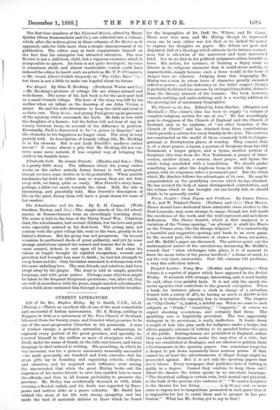CURRENT LITERA 1 U RE.
Life of the Rev. Stephen Hislop. By G. Smith, C.I.E., LL.D. (Murray.)—This is an excellent life of one of the most remarkable and successful of Indian missionaries. Mr. S. Hislop, settling in Nagpore in 1844 as a missionary of the Free Church of Scotland, laboured there for twenty years, and founded what promises to be one Of the most progressive Churches in the peninsula. A man of tireless energy, a geologist, naturalist, and antiquarian, he explored every portion of the great province, and specially in- tarested himself in the million or more of aborigines who still dwell, under the name of Gonda, in the hills and forests, and whose language he first reduced to writing. His preaching, in which he was incessant, was for a pioneer missionary unusually successful —he made personally one hundred and forty converts—but his great gifts lay in founding and organising schools, colleges, and churches, and he acquired such influence even among the unconverted, that when the great Mutiny broke out; the eagerness of his native friends to save him enabled him to warn the officials, and thus in all human probability to preserve the province. Mr. Hislop was accidentally drowned in 1863, while crossing a flooded nullah, and his death was regarded by Euro- peans and natives alike as a grave calamity. Mr. Smith has related the story of his life with strong sympathy, and has made the best of materials inferior to those which he found for the biographies of Dr. Duff, Dr. Wilson, and Dr. Carey. These were wise men, and Mr. Hislop, though he impressed every one he met, either was not that, or he lacked the power to express his thoughts on paper. His letters are poor and. disjointed, full of a theology which attracts by its intense earnest- ness, but is otherwise of the narrowest and least instructed kind. Nor do we find in his political judgments either breadth or force. His notion, for instance, of forming a Sepoy army so diverse in its religious character that it could never mutiny, is impracticable, simply because such a force would in the hour of danger have no cohesion. Judging from this biography, Mr. Hislop was a man in whom force of character greatly exceeded reflective power ; and his deficiency in the latter respect, though it probably facilitated his success by extinguishing doubt, detracts from the literary interest of his remains. The book, however, conceals nothing and omits nothing, and is a worthy addition to the growing list of missionary biographies.










































 Previous page
Previous page